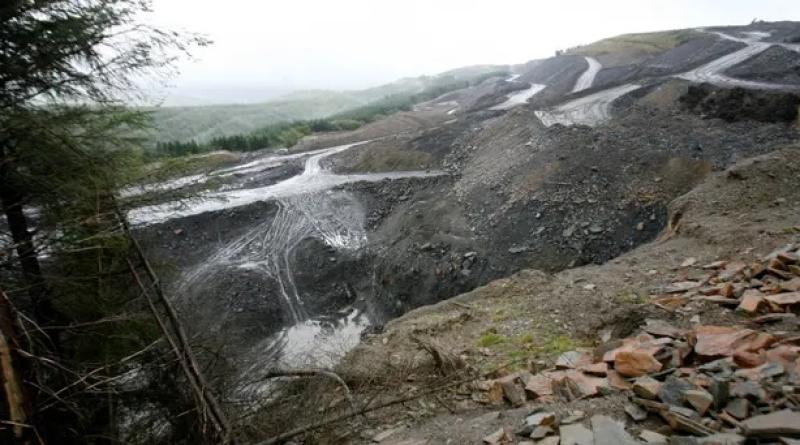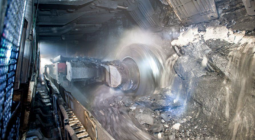Wales coalmine extension may soon be approved despite Cop26 pledges

Conditional licence granted in 2016 at Aberpergwm has led to row between Whitehall and devolved administration
Plans for the expansion of an underground coalmine in Wales could be approved imminently despite pledges made at the Cop26 climate conference to move away from the dirtiest fossil fuel.
The Coal Authority is imminently expected to decide whether the conditions have been met to allow work to begin at a recently active deep-shaft site in the Neath Valley, south Wales.
The plans would see an extension to the existing Aberpergwm drift coalmine site that is thought to be Europe’s biggest source of anthracite.
A row has emerged since Cop26 between ministers at Whitehall and the devolved Welsh administration over which government office holds responsibility for reviewing and making a final decision on the impending permit.
In 2016, Energybuild Ltd was given a conditional mining licence that would allow the firm to extract up to 40m tonnes of anthracite over the coming two decades. But the company says that if the Aberpergwm project were to go ahead, it would seek to dig up only about 7.3m tonnes at a rate of about 350,000 tonnes a year.
Anthracite (sometimes referred to as “hard coal”) has the highest carbon content of all coal varieties, although it has relatively low levels of sulphur and produces less particulate matter than other forms of coal. It can be used for a number of industrial purposes, but is also burned as a domestic fuel.
According to Wales’s deputy climate change minister, Lee Waters, the Aberpergwm scheme could emit 100m tonnes of CO2 over its lifetime, along with considerable quantities of methane. He says the date of the licence means that new devolved powers – which came into force in 2018 and have been used to block new opencast mining applications – do not apply to this case. Waters has written to the Department for Business, Energy and Industrial Strategy, in which the Coal Authority is housed, to request the licence be cancelled.
“We want to keep this coal in the ground,” he told the Welsh parliament. “But the UK government, because of the powers in place, threaten to sit by and watch this coal being extracted in the face of our wishes.”
The project would see the expansion of the only anthracite mine operating anywhere in the UK, with the country’s only other major ongoing coal scheme, the surface mine at Ffos-y-Fran, also located in south Wales.
Aberpergwm may come to represent a serious unforeseen headache for Boris Johnson’s government, as the UK pledged to lead international coal phase-out efforts when hosting November’s UN climate summit.
“There should be no question of extending coalmines anywhere in the UK,” said John Ashton, a former climate envoy. “It beggars belief that this should even be under consideration at Aberpergwm, with so much at stake after the Glasgow climate Cop for both Cardiff and Westminster. This has all the hallmarks of a decision that has not yet received the high-level attention it urgently needs.”
More than 3,500 emails about the Aberpergwm project have been sent this week to the offices of Waters and Michael Gove at the Department for Levelling Up, Housing and Communities. Gove is also due to rule early next year on plans for a controversial new deep coalmine in west Cumbria.
Energybuild says the Aberpergwm project would sustain 160 jobs and dozens more in the supply chain. It has promised to gradually move away from supplying steelworks at Port Talbot, where about half of the coal it produces currently goes.
The UK government intends to decarbonise domestic steel production by 2035. Tata’s Port Talbot and British Steel’s Scunthorpe Steelworks are the country’s second and third biggest single-site emitters of carbon, and the global steel industry is estimated to produce 11% of the world’s total CO2 emissions.
Energybuild aims to have a greater share of its coal destined for other end uses such as water filtration, which at present accounts for about 15% of its market. A spokesperson for the firm said: “We are the only producer of anthracite for filter media in Europe.”
Daniel Therkelsen, from the Coal Action Network, said: “We hear EnergyBuild Ltd recycling the same greenwash of other coal operators, but the bottom line is the more coal we mine, the more we use – driving localised air pollution around mines and steelworks, and global climate change.
“It’s vital that the Welsh and UK governments resolve which has the powers to stop this climate wrecking extension – and use those powers immediately, as this pending licence may be deconditionalised imminently.”
A UK government spokesperson said: “The Coal Authority and Welsh ministers are continuing to discuss the matter but no decisions have been made yet on whether the mining project can progress.”
This article was amended on 24 and 26 December 2021 to clarify that the plans are for the expansion of an existing mine, not the creation of a new one; also, the spelling of Aberpergwm was corrected in the subheading.
cover photo Aberpergwm colliery in Wales, pictured in 2007. The Coal Authority is imminently expected to decide whether the conditions have been met to allow work to begin at the old deep-shaft site. Photograph: Bloomberg/Getty Images




